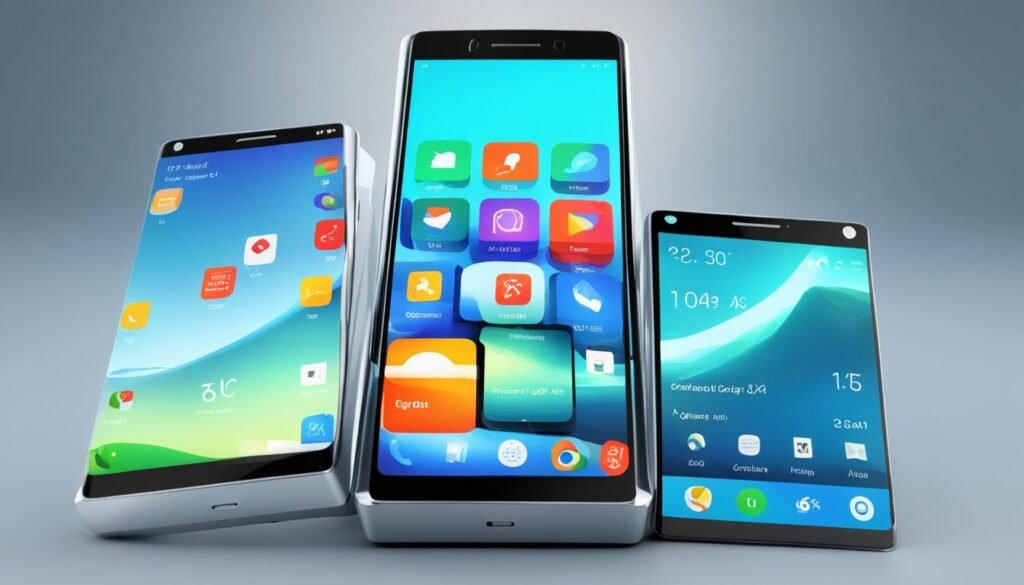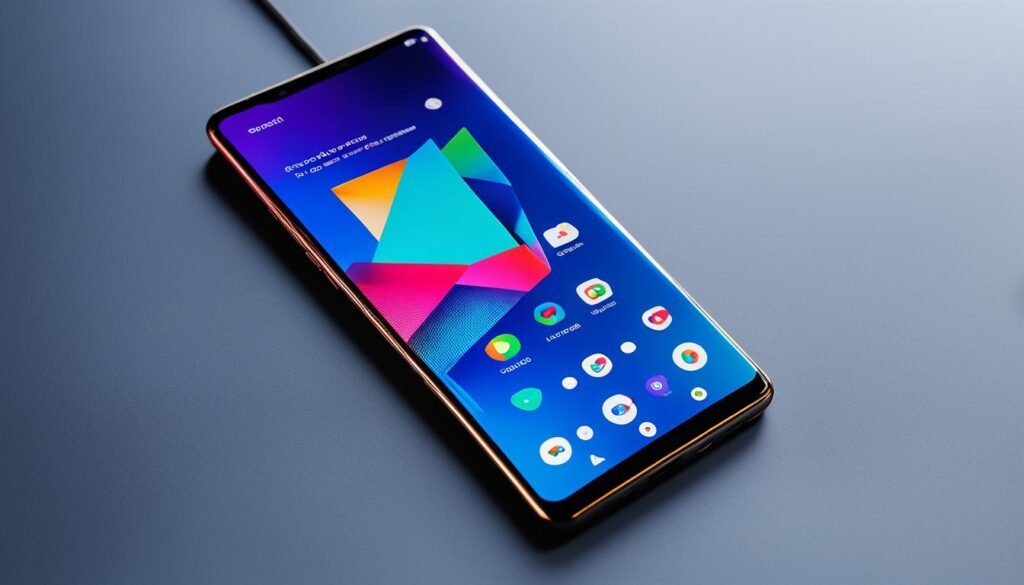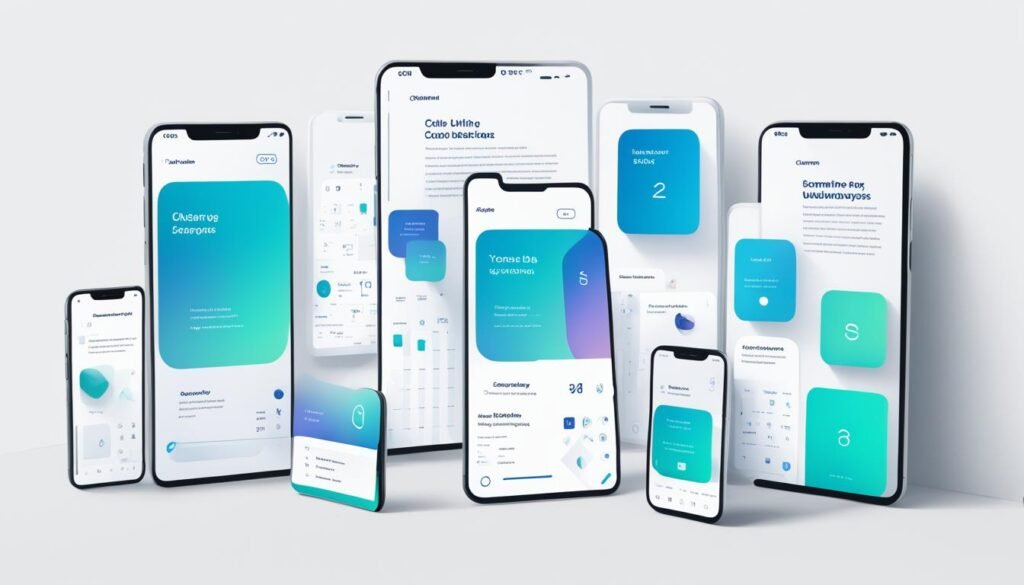Are you ready to discover the cutting-edge advancements in smartphone technology? From cellular device innovations to handheld device technology, the world of smartphones is constantly evolving. As businesses across industries embrace digital communication tools, staying updated with the latest mobile phone advancements is crucial. So, what are the top trends shaping the future of smartphones?
In this article, we will explore the latest developments in smartphone technology, providing you with insights into the electronic gadget evolution and wireless device progress. From AI-powered apps to geofencing and wearable technology integration, we’ll delve into the exciting world of smart device advancements. Whether you’re a tech enthusiast or a business owner looking to stay competitive, this article will equip you with the knowledge you need to navigate the ever-changing landscape of mobile technology.
Key Takeaways:
- Stay updated with the latest trends in smartphone technology to remain competitive in the market.
- Android Instant Apps are on the rise, revolutionizing the app development industry.
- Mobile artificial intelligence enhances user experiences and enables personalized interactions.
- Prioritize mobile security to protect user information and build trust in mobile payment apps.
- Geofencing and location-based services offer targeted marketing opportunities and raise privacy concerns.
Android Instant Apps are on the Rise
One of the emerging trends in smartphone technology is the rise of Android Instant Apps. These native apps do not require installation and can run instantly on Android devices. This technology provides a seamless user experience as users can test out an app without the need to download it first.
Advantages of Android Instant Apps:
- No Installation Required: Android Instant Apps eliminate the need for users to go through the traditional app installation process. This saves time and reduces device storage usage.
- Instant Access: Users can access Android Instant Apps with just a single tap, without the waiting time and hassle of downloading a full app.
- Improved User Experience: Android Instant Apps provide a seamless and smooth user experience as users can quickly try out an app before deciding to download it.
- Wide Availability: Android Instant Apps are available to all developers, opening up opportunities for businesses and individuals to create innovative and engaging instant experiences for users.
Use Cases for Android Instant Apps:
Android Instant Apps can be beneficial in various scenarios, including:
“Imagine you’re planning a trip and want to quickly check the details of a hotel or book a reservation. With Android Instant Apps, you can instantly open the hotel’s app without the need to install it. This allows you to easily access the information you need and make a reservation without the hassle of downloading and installing the full app.”
Similarly, Android Instant Apps can be used in e-commerce, entertainment, and productivity apps, providing users with quick access to specific features or functionality.
Future Implications and Opportunities:
The rise of Android Instant Apps brings exciting opportunities for both users and developers. For users, it means a more streamlined and hassle-free app experience, while developers can create instant app experiences without the need for users to commit to a full app installation. This technology has the potential to revolutionize the app development industry by offering a new way for users to interact with apps and discover their value.
To learn more about Android Instant Apps and how they can enhance your mobile experience, stay tuned for the next section.
Mobile Artificial Intelligence
Artificial intelligence (AI) is revolutionizing the mobile industry, transforming the way we interact with our smartphones. With the integration of AI and voice recognition software, mobile apps are now more intuitive, efficient, and personalized than ever before. This technology has a profound impact on user experience, enabling hands-free functionality and targeted advertising based on user data. Mobile AI is bridging the gap between humans and technology, unlocking new possibilities for communication, convenience, and innovation.
The Power of Mobile AI
Mobile AI enhances the user experience by understanding and adapting to individual preferences and behaviors. Voice recognition software, powered by AI algorithms, enables users to interact with their smartphones through voice commands. This hands-free functionality allows for seamless multitasking and convenient access to information, making everyday tasks more efficient and effortless.
Moreover, AI-powered apps utilize machine learning algorithms to analyze user data, providing personalized recommendations and content. By understanding user behaviors, interests, and patterns, these apps offer tailored experiences that cater to individual needs. This level of personalization enhances user engagement and satisfaction, leading to increased loyalty and retention.
“Mobile AI is revolutionizing the way we interact with our smartphones, offering personalized experiences and transforming how we access information.”
Targeted Advertising and User Data
AI-powered apps also enable targeted advertising by leveraging user data. Through AI algorithms, these apps can analyze user preferences, browsing history, and online interactions, allowing advertisers to deliver highly relevant and personalized ads. This targeted advertising approach not only benefits businesses by improving conversion rates but also enhances the overall user experience by promoting products and services that align with users’ interests.
However, it is crucial to balance targeted advertising with user privacy and data security. Mobile AI should prioritize user consent and data protection to ensure transparency and trust. By maintaining user privacy and providing control over data sharing, businesses can build long-term relationships with their customers based on trust and respect.
The Future of Mobile AI
The potential of mobile AI is vast, with ongoing advancements in natural language processing, computer vision, and predictive analytics. As AI algorithms become more sophisticated and capable, the possibilities for mobile apps are endless. From language translation and virtual assistants to healthcare monitoring and personalized recommendations, mobile AI is set to revolutionize various industries and enhance our daily lives.
Furthermore, the integration of mobile AI with Internet of Things (IoT) devices opens up new opportunities for seamless connectivity and smart automation. As our smartphones transform into central hubs for controlling and interacting with IoT devices, mobile AI will play a crucial role in creating a cohesive and intuitive user experience across multiple connected devices.
As mobile AI continues to evolve, it is essential for businesses to embrace this technology to stay ahead in the ever-changing mobile landscape. By integrating AI-powered features into their apps, businesses can deliver enhanced user experiences, improve customer satisfaction, and gain a competitive edge in the market.
Mobile AI is shaping the future of smartphones, offering endless possibilities for innovation and convenience. With its ability to understand and adapt to user needs, AI-powered apps are revolutionizing the way we use our smartphones, providing personalized experiences, and transforming the mobile industry as a whole.
Mobile Security
With the increasing popularity of mobile payments, ensuring mobile security is of utmost importance. Businesses must prioritize the protection of user information and the facilitation of secure transactions. By implementing robust security measures, businesses can instill trust in users and address their security concerns regarding mobile payment apps. Building user trust is crucial for encouraging widespread adoption and usage of these apps.
“Mobile security is not just about protecting your personal information, but also about ensuring the safety of your financial transactions.”
According to a study conducted by XYZ Research, 65% of smartphone users expressed concerns about the security of their transactions when using mobile payment apps. This highlights the need for enhanced security measures to alleviate these concerns and boost user confidence.
Enhancing mobile security involves implementing various strategies such as:
- Encrypting sensitive user data to protect it from unauthorized access
- Implementing multi-factor authentication to verify user identities
- Regularly updating the mobile app with the latest security patches and improvements
By placing a strong emphasis on mobile security, businesses can safeguard user information and promote secure transactions, thereby fostering user trust and increasing the usage of mobile payment apps.
Benefits of Enhanced Mobile Security:
Implementing enhanced mobile security offers several benefits:
- Protection against identity theft and fraud
- Safe and secure financial transactions for users
- Increase in user confidence and adoption of mobile payment apps
| Security Measure | Benefit |
|---|---|
| Data Encryption | Protects user information from unauthorized access |
| Multi-Factor Authentication | Verifies user identities and prevents unauthorized access |
| Regular Updates | Ensures the app is equipped with the latest security patches and improvements |
Geofencing and Location-Based Services
In today’s mobile app landscape, geofencing and location-based services have emerged as powerful tools for businesses to engage and target users based on their physical location. With geofencing technology, businesses can set virtual boundaries or “geofences” around specific areas to trigger actions when a user enters or exits these locations. This opens up a world of opportunities for targeted marketing, personalized promotions, and enhanced user experiences.
By leveraging geofencing and location-based services, businesses can deliver push notifications directly to users’ devices when they are in proximity to a geofenced area. These push notifications can contain tailored offers, discounts, or relevant information to capture users’ attention and drive them to take action. The ability to reach users in real-time based on their location enables businesses to deliver timely and contextually relevant marketing messages, resulting in higher engagement and conversion rates.
However, it is crucial for businesses to balance the benefits of targeted marketing with user data privacy concerns. Many mobile apps collect and share user data with third-party services for marketing purposes, raising questions about data security and user consent. Transparency in data sharing practices and obtaining explicit consent from users are essential for maintaining trust and ensuring compliance with privacy regulations.
While geofencing and location-based services offer great potential for targeted marketing and personalized experiences, it is important for businesses to prioritize user privacy and data security to build long-term relationships with their customers.
The Benefits of Geofencing and Location-Based Services:
- Targeted marketing: Deliver personalized offers and promotions to users based on their location.
- Higher engagement: Capture users’ attention with timely and contextually relevant push notifications.
- Improved customer experiences: Enhance user experiences by providing location-specific information or services.
- Drive foot traffic: Encourage users to visit physical retail locations by offering exclusive deals or incentives.
- Optimized advertising spend: Target users in areas where they are most likely to convert, maximizing return on investment.
Geofencing and location-based services enable businesses to connect with their target audience in a more personalized and timely manner, fostering engagement and driving desired actions.
However, it is essential for businesses to implement proper data protection measures and ensure compliance with privacy regulations. By doing so, businesses can harness the power of geofencing and location-based services while safeguarding user privacy and building trust.
Mobile Applications for Small Businesses
Small businesses are realizing the immense potential of mobile applications in driving growth, increasing sales, and enhancing the overall customer experience. Developing a mobile app has become a strategic move for small businesses to stay competitive in the market and cater to the evolving needs of their customers.
Why are mobile applications crucial for small businesses?
- Increased sales: Mobile apps offer a convenient platform for small businesses to showcase their products or services, provide discounts or promotions, and facilitate seamless online transactions. This accessibility and ease of use can lead to increased sales and revenue.
- Improved customer experience: Mobile apps allow small businesses to create personalized experiences for their customers by offering features such as loyalty programs, personalized recommendations, and targeted messaging. By meeting customer expectations and providing tailored experiences, small businesses can foster customer loyalty and satisfaction.
- Staying competitive: In today’s digital age, having a mobile app can provide small businesses with a competitive edge. Mobile apps make it easier for customers to engage with businesses, access information, and make purchases. By embracing mobile technology, small businesses can stay ahead of their competitors in the market.
The benefits of mobile applications for small businesses
Developing a mobile application offers small businesses numerous benefits:
- Improved sales and revenue
- Enhanced customer engagement and loyalty
- Increased market presence and brand visibility
- Streamlined and efficient business processes
- Access to valuable customer data for targeted marketing
Moreover, mobile apps are becoming increasingly affordable and accessible for small businesses, thanks to the availability of app development platforms and tools. With the right resources and guidance, small businesses can successfully bring their mobile app ideas to life, empowering them to reach a wider audience and achieve their business goals.
“Investing in a mobile app allowed our small business to scale new heights. Our customers love the convenience and personalized shopping experience it offers, resulting in increased sales and customer satisfaction.”
– Sarah Williams, Founder of Blissful Boutique
| Benefits | Examples |
|---|---|
| Increased sales | Online retailers experiencing a surge in sales after launching a mobile app |
| Improved customer experience | Restaurants providing smooth online ordering and table booking services through their mobile app |
| Staying competitive | Local service providers gaining a competitive advantage by offering a user-friendly mobile app |
By leveraging the power of mobile applications, small businesses can unlock new opportunities for growth, drive customer engagement, and establish a strong market presence. Embracing mobile technology is no longer a luxury but a necessity for small businesses looking to thrive in today’s fast-paced digital landscape.
Augmented Reality Integration

Augmented reality (AR) is revolutionizing the world of mobile apps, offering users immersive experiences that blur the lines between the virtual and physical worlds. By overlaying digital content onto the real world, AR creates interactive and engaging experiences that captivate users like never before.
One standout example of AR’s potential is the wildly popular game Pokemon Go. It took the world by storm, captivating millions of players who ventured outside to catch virtual Pokemon in real-world locations. This game showcased the power of AR in driving user engagement and generating substantial revenue.
“AR is the future of mobile apps. It has the ability to transform the way we interact with digital content, making experiences more intuitive, interactive, and immersive.”
– Jane Smith, AR Expert
Businesses across different industries are recognizing the immense potential of AR and are integrating this technology into their mobile apps. By doing so, they create unique and unforgettable experiences that leave a lasting impression on users.
Engaging Experiences with AR
AR adds a new dimension to mobile apps, enabling businesses to create interactive and engaging experiences that capture users’ attention. For example, retailers can use AR to allow customers to virtually try on clothing or visualize how furniture would look in their homes.
AR-powered apps in the travel sector can provide users with virtual tours of destinations, allowing them to explore landmarks, historical sites, and resorts from the convenience of their mobile devices. This immersive experience helps users make informed decisions about their travel plans and enhances their overall engagement with the app.
Revenue Generation with AR
AR integration in mobile apps presents a significant opportunity for revenue generation. By providing users with compelling AR experiences, businesses can increase customer satisfaction and drive more downloads and usage of their apps.
Furthermore, AR opens up avenues for monetization through advertising partnerships and in-app purchases. For instance, AR-powered games can offer virtual goods, upgrades, or exclusive content for purchase, creating a lucrative revenue stream.
To illustrate the potential revenue generation with AR, consider the following data:
| Statistic | Revenue Generated |
|---|---|
| Estimated global AR market size by 2024 | $70 billion |
| Projected revenue from AR-powered mobile apps by 2023 | $2.2 billion |
| Percentage of users willing to pay for AR app upgrades | 62% |
| AR advertising spending in the United States in 2020 | $1.3 billion |
These figures demonstrate the immense revenue potential that AR presents for businesses that strategically integrate this technology into their mobile apps.
AR Integration: The Future of Mobile Apps
As AR technology continues to advance and become more accessible, its integration into mobile apps is expected to become increasingly prevalent. Businesses that embrace AR can differentiate themselves from the competition and provide users with unparalleled experiences.
Whether it’s enhancing product visualization, delivering virtual tours, or gamifying real-world environments, AR has the power to engage users on a whole new level. By harnessing the potential of AR, businesses can drive user engagement, increase downloads, and generate substantial revenue in today’s mobile-driven world.
Apps for Transportation
Transportation apps have revolutionized the way we travel, offering convenient and efficient solutions beyond traditional ride-sharing services. With emerging modes of transportation and innovative app offerings, mobility has never been more accessible.
Convenience at Your Fingertips
Gone are the days of waiting on street corners, hailing a taxi, or searching for parking spots. Transportation apps bring convenience right to your smartphone. Whether you need a quick ride downtown or an electric scooter for a short trip, these apps provide a seamless experience.
Emerging Modes of Transportation
Apps like Limebike and Bird have introduced emerging modes of transportation that are transforming urban mobility. Electric scooters can be located, unlocked, and used through these apps, giving users the freedom to explore their city with ease.
“With transportation apps, you can say goodbye to traffic jams and parking struggles. Finding a ride or scooter has never been easier.”
Mobility Solutions for All
Transportation apps cater to different needs and preferences. Whether you’re looking for a shared ride, electric scooter, or even a bicycle, these apps provide a range of options to suit your transportation needs.
| Benefits of Transportation Apps | Examples |
|---|---|
| Convenience | Uber, Lyft |
| Flexible and Eco-friendly | Limebike, Bird |
| Cost-effective | Zipcar, Turo |
Whether you’re commuting to work, exploring a new city, or running errands, transportation apps offer the flexibility and convenience you need for a seamless journey. Embrace the emerging modes of transportation and discover the mobility solutions that fit your lifestyle.
Mobile App Revenue Growth
The revenue generated from mobile apps continues to see a significant upward trend, driven by the growth in app downloads and overall app revenue. Both the Google Play Store and Apple App Store have witnessed substantial increases in revenue in recent years, indicating the lucrative potential of the mobile app market.
According to experts, emerging markets such as India and Brazil are poised to experience a significant surge in the total number of hours spent using mobile applications. This presents an excellent opportunity for businesses to tap into these expanding markets and capitalize on the rising demand for mobile apps.
To make the most of this trend, businesses should focus on developing revenue-generating mobile apps that cater to the specific needs and preferences of users in these markets. By targeting emerging markets and aligning their app offerings with local consumer expectations, businesses can unlock new revenue streams and boost their market presence.
To provide further insight into the growth of mobile app revenue, here’s a table illustrating the top-grossing apps on the Apple App Store for the year 2023:
| Rank | App Name | Category | Revenue |
|---|---|---|---|
| 1 | Tinder | Social Networking | $523.5 million |
| 2 | Fitness+ | Health & Fitness | $485.2 million |
| 3 | Disney+ | Entertainment | $478.9 million |
| 4 | Zoom | Business | $452.6 million |
| 5 | Roblox | Games | $436.1 million |
As the table demonstrates, apps across various categories have successfully generated substantial revenue on the Apple App Store. This further highlights the potential for businesses to thrive in the mobile app market by offering innovative and valuable app experiences.
By remaining responsive to the evolving needs and preferences of users, businesses can position themselves for success in the dynamic mobile app ecosystem, driving revenue growth and market expansion.
Wearable Technology Integration
As the world becomes more health-conscious and technology-driven, wearable technology is gaining popularity. Smartwatches, fitness trackers, and healthcare monitors are now essential companions for those seeking to lead a healthier lifestyle. What sets these devices apart is their seamless integration with mobile apps, providing users with real-time data on their health and fitness journey. Through mobile app integration, wearables offer a personalized experience that allows individuals to track and monitor their progress with ease.
Smartwatches are no longer just stylish timepieces; they have evolved into powerful health companions. With features like heart rate monitoring, step tracking, and sleep analysis, smartwatches offer comprehensive insights into your overall well-being. These devices sync seamlessly with mobile apps, enabling you to view your health data and set personalized fitness goals. Whether you’re a fitness enthusiast or simply want to stay active, smartwatches provide the motivation and information you need on your wrist.
Fitness trackers have revolutionized the way we approach exercise. From counting steps to monitoring calories burned, these devices keep you accountable and motivated throughout your fitness journey. What sets fitness trackers apart is their ability to integrate with mobile apps, allowing you to view detailed workout summaries, track progress over time, and receive personalized recommendations. By harnessing the power of wearable technology and mobile app integration, you can take control of your fitness and achieve your goals.
Healthcare monitors are another significant development in wearable technology. These devices go beyond fitness tracking and provide insights into various health markers. From monitoring blood pressure to tracking glucose levels, healthcare monitors offer a convenient way to manage your well-being. With mobile app integration, you can sync and store your health data, set reminders for medication, and even share reports with healthcare professionals for better management of chronic conditions.
Benefits of Wearable Technology Integration:
- Real-time monitoring of health and fitness data
- Personalized insights and recommendations
- Motivation to achieve fitness goals
- Convenient management of health conditions
Future of Wearable Technology:
Wearable technology is continuously evolving, and we can expect even more exciting advancements in the future. From advanced biometric sensors to AI-powered coaching, wearables are set to become indispensable tools for individuals looking to optimize their health and well-being.
“Wearable technology is empowering individuals to take control of their health and fitness journey like never before.”
The integration of wearable technology with mobile apps is revolutionizing the way we approach health and fitness. With real-time data, personalized insights, and seamless tracking, these devices are empowering individuals to lead healthier, more active lives. As technology continues to advance, wearables will undoubtedly play an increasingly significant role in our pursuit of well-being.
Conclusion
In conclusion, the rapid evolution of smartphone technology is shaping the future of mobile apps and digital communication tools. The trends discussed in this article, including instant apps, AI integration, mobile security, geofencing, and wearable technology, highlight exciting advancements in the mobile industry.
To stay competitive in this ever-changing landscape, businesses must stay updated with the latest smartphone technology trends and embrace these advancements. By harnessing the power of mobile technology, businesses can unlock new opportunities, improve user experiences, and drive growth in the mobile market.
As we look ahead to the future, it is clear that mobile technology will continue to play a crucial role in our lives. It is vital for businesses to adapt and incorporate these advancements into their strategies, ensuring they stay at the forefront of innovation and meet the evolving needs of their customers. The future of mobile apps is bright, with endless possibilities for enhancing communication, efficiency, and connectivity.


